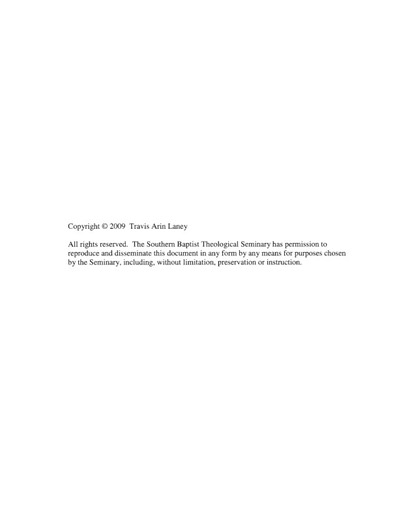| dc.contributor.advisor | Beougher, Timothy K. | |
| dc.contributor.author | Laney, Travis Arin | |
| dc.date.accessioned | 2011-06-28T14:52:19Z | |
| dc.date.available | 2011-06-28T14:52:19Z | |
| dc.date.issued | 2009-10-26 | |
| dc.identifier.uri | http://hdl.handle.net/10392/2919 | |
| dc.description.abstract | This dissertation explores the hardening mentioned in Romans 11:25 and its role in Israel's rejection of the gospel. Chapter 1 describes the difficulties faced when addressing the issue of hardening. Additionally, the thesis states that in the case with the Jewish people, the partial hardening has divine origins and serves a glorious purpose.
Chapter 2 provides three arguments from Romans 9-11 explaining Israel's rejection of Jesus. These three arguments underline the belief that although vast numbers of Jewish people have rejected Jesus, God's word has not failed. The chapter concludes with the primary argument offered in that Israel's rejection is due to a partial hardening.
Chapter 3 presents the argument that God is the primary cause of Israel's hardening. After exploring Scriptures where man seems responsible for his own hardening, the chapter argues that based on Romans 9-11, and especially the statement that God has mercy on whom he wills and he hardens whom he wills, the hardening Israel is experiencing has God rather than man as it cause.
Chapter 4 explores the various reasons Paul gave in Romans 11 for the divine hardening. After refuting the idea that the hardening is a demonstration of God's rejection of Israel, that chapter examines three reasons why Israel is experiencing this hardening.
Chapter 5 looks at Israel's future once the hardening is removed. The chapter focuses specifically on what the phrase "all Israel will be saved" means. Examined in this chapter are the three traditional interpretations regarding this statement. Strengthens and weaknesses are provided for each position.
Chapter 6 discusses the implications for evangelism for SBC entities in light of this divine hardening. After examining the history of the SBC's efforts to evangelize the Jewish people, discussion surrounds future strategies for the SBC at the national, state and local levels.
Chapter 7 provides a brief summary of the work and restates the thesis and major issues discussed within the context of the paper. It also offers some suggestions and unanswered questions for further study on this topic. | en_US |
| dc.language.iso | en_US | en_US |
| dc.subject | Bible. N.T. Romans IX-XI--Criticism, interpretation, etc. | en_US |
| dc.subject | Bible. N.T. Romans XI, 25--Criticism, interpretation, etc. | en_US |
| dc.subject | Missions to Jews | en_US |
| dc.subject | Evangelicalism--Relations--Judaism | en_US |
| dc.subject | Judaism--Relations--Evangelicalism | en_US |
| dc.title | A partial hardening has come upon Israel: Divine hardening and its implications for Jewish evangelism | en_US |
| dc.type | Electronic dissertation | en_US |
| dc.publisher.institution | Southern Baptist Theological Seminary | en_US |

